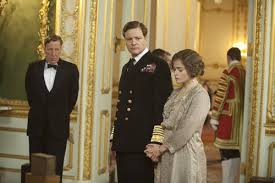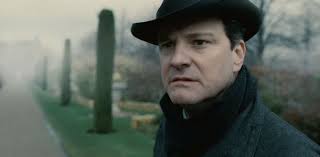America loves a royal family, doesn't it? Currently, we're fascinated by the upcoming royal wedding of Prince William, namely women who wish some prince would come and sweep them of their feet. But in all seriousness, its strange that Americans are as interested in the affairs of the royal family as we are, given how opposed to British rule our nation's forefathers and heroes were, as well as the diminished power of the monarchy (since much of the Empire has now gained independence and no longer serves the Queen). This obsession is especially apparent in film, where films about royalty past and present densely populated the first half of the 20th century, and today there's at least a handful of films about the drama of the crown. Unlike recent years, though, 2010's royal-family film isn't set in the Oscar-winning-costumes-friendly height of the British Empire; instead, it tackles a much more interesting period for the monarchy: World War Two.




The King's Speech is the true story of King George VI (Colin Firth), who was afflicted with a stammer since the age of five. George, or "Bertie" as his family called him, dreaded giving public speeches, and was thankful that his older brother, King Edward VIII (Guy Pearce), was ahead of him in the royal order. Still, he visits speech therapists, none of whom are helpful until his wife Elizabeth (Helena Bonham Carter) brings him to see Lionel Logue (Geoffrey Rush), an unorthodox Australian "speech corrector." George and Logue soon develop a friendship that will be tested as George has to prepare for war with Nazi Germany, which will require countless speeches, including the title one, which is George's first public address as king.
The film is decidedly old-fashioned in its storytelling. This is the kind of film that used to pick up Oscars during the 1950s and 1960s, with a straight-forward three-act structure that often feels like it was written as a play, with act breaks and plenty of two-character scenes. And I don't mean any of this as a slight against the film; in fact, I loved how unabashedly old-fashioned it was. With many of this year's films following non-linear, restructured plots, its refreshing to see a film that puts its story and its acting first.
And the acting is aces. Colin Firth, who was my choice for last year's Best Actor Oscar, could easily win this year for his terrific, confident performance. He lends Bertie a regal air that's never too guarded for the audience to be let in, and he paints him as a flawed man with a monumental task ahead of him. Helena Bonham Carter is the very definition of a "supporting actress," as her Elizabeth comforts Bertie and does everything she can to let him know that, no matter what, she loves him and will stand by his side, stammer or not. Geoffrey Rush is surprisingly toned-down (well, toned-down by Geoffrey Rush standards), giving a fine performance that never stretches into caricature and communicates the failures in Lionel's own life without having to be too explicit or showy. And Guy Pearce gets one particularly great scene in which he viciously mocks Bertie; its a great reminder of how terribly underused Pearce is nowadays. I personally enjoyed Timothy Spall as Winston Churchill as well; he's a pretty awesome dead-ringer.
Then, of course, there's some rather magnificent work from director Tom Hooper (previously best-known for the HBO miniseries John Adams and last year's The Damned United). He's not as flashy or stylistic as many well-known directors are today, but he uses more subtle camera movements and motifs to visually push the film's themes. For much of the film, none of the characters are shown directly in the middle of the screen; instead, they are off to one side or the other, illustrating their struggles to reach the "midpoint" of normalcy. For Bertie, that's correcting his stammer so that he can lead his people into war; for Lionel, that means finding the validation in his life that he's been searching for. Hooper also uses the London fog as a means of characterizing the unknown future, not just of Britain going into war and Bertie's ability to lead them but also of the power of the royal family itself. The film does not directly address this, but it will be Prime Minister Churchill, not King George VI, that will be remembered for leading Britain through its darkest hour. With WWII, the power of the British monarchy began to truly fall to figurehead status while the prime minister would be considered the one responsible for the country's welfare. Hooper's use of fog shows this fading of the royal family.
The King's Speech may be the kind of film that's no longer "cool" to like in Hollywood and pop culture as a whole, but its a singularly refreshing film that doesn't rely on big ideas or flashy style, but rather good, old-fashioned storytelling and acting. There's plenty of drama, intrigue, and redemption here to satisfy any kind of moviegoer.
Comments